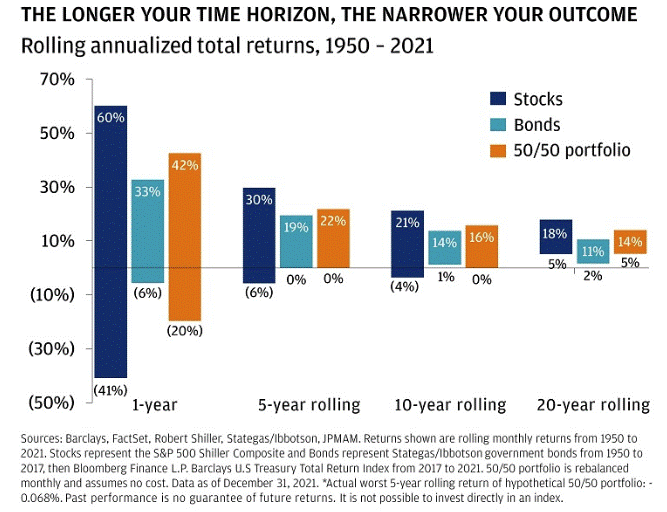Market Update
Staying The Course Through Volatile Markets
From the Desk of Brian Babbitt, CFA, CAIA
Chief Investment Officer & Chief Compliance Officer
For most of 2022, markets have been in the news as inflation, armed conflicts and growth concerns have led to meaningful market swings. This past week was no exception. For their part, financial news outlets haven’t helped matters using sensationalized headlines to generate more “clicks” or “views” from their audience – or perhaps more anxiety.
Should we be concerned about our current environment? Absolutely. However, it’s important to keep things in perspective and remind ourselves that we’ve overcome challenges in the past. Similar to today, it was difficult to see how we might emerge going forward. However, events such as the tech bubble, 9/11, Global Financial Crisis and Covid-19 did not last – markets did in fact continue to reward investors.
With recent market losses in mind, what should you do? We have outlined four important steps for you to take below:
1. Do your best to remain calm. No one likes seeing their account balances decline during periods of market angst and volatility. However, gain comfort that throughout history, positive years have significantly outweighed negative ones – there is reason for optimism:

2. Stay invested for the long term and remain diversified –> the range of returns shrinks over time. History suggests that risk declines the longer you hold an asset. Also note that as your holding period lengthens, fewer negative results enter in.
To take it a step further, over the past 70 years, a 50/50 blend of stocks and bonds has not suffered a negative annualized return over any five-year rolling period – also an argument to remain diversified.

3. Focus on time in the market versus attempting to time the market. Attempting to the time the market almost never works, especially when things change rapidly – which is almost always the case. As you will note, “Fully Invested” is the best choice throughout a variety of market environments as illustrated below:

4. Stay in contact with your advisor. It’s human nature for you to feel emotional about your investments, but, acting on those emotions is typically counterproductive. An important aspect of our job is to act as an emotional circuit breaker for you – to prevent emotional decisions at precisely the wrong time. When someone sells during market declines it means locking in those short-term losses with no chance of rebound.
Whatever the cause, financial markets have experienced sell-offs throughout history and following each of them, they have emerged stronger. While we expect markets to experience more ups and downs in the next few months, resolve to sticking with your plan and gain comfort in the knowledge that our team has been through similar periods and successfully guided our clients through them.
______________________________________________________________________________________________________________
The views expressed represent the opinions of Financial Insights, Inc. (Financial Insights) and are subject to change. These views are not intended as a forecast, a guarantee of future results, investment recommendation, or an offer to buy or sell any securities. The information provided is of a general nature and should not be construed as investment advice or to provide any investment, tax, financial or legal advice or service to any person.
Additional information, including management fees and expenses, is provided on Financial Insights’ Form ADV Part 2, which is available upon request.
